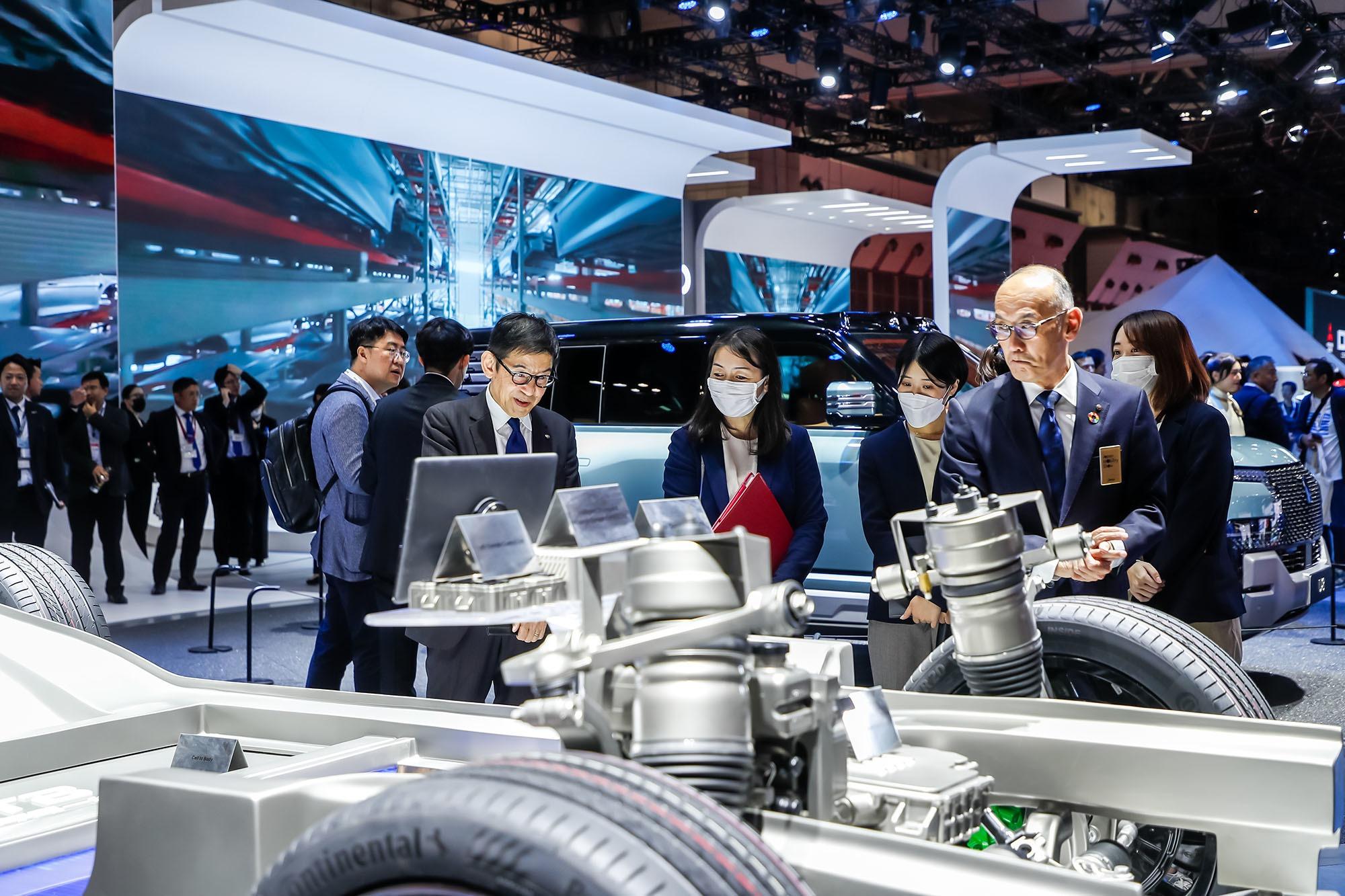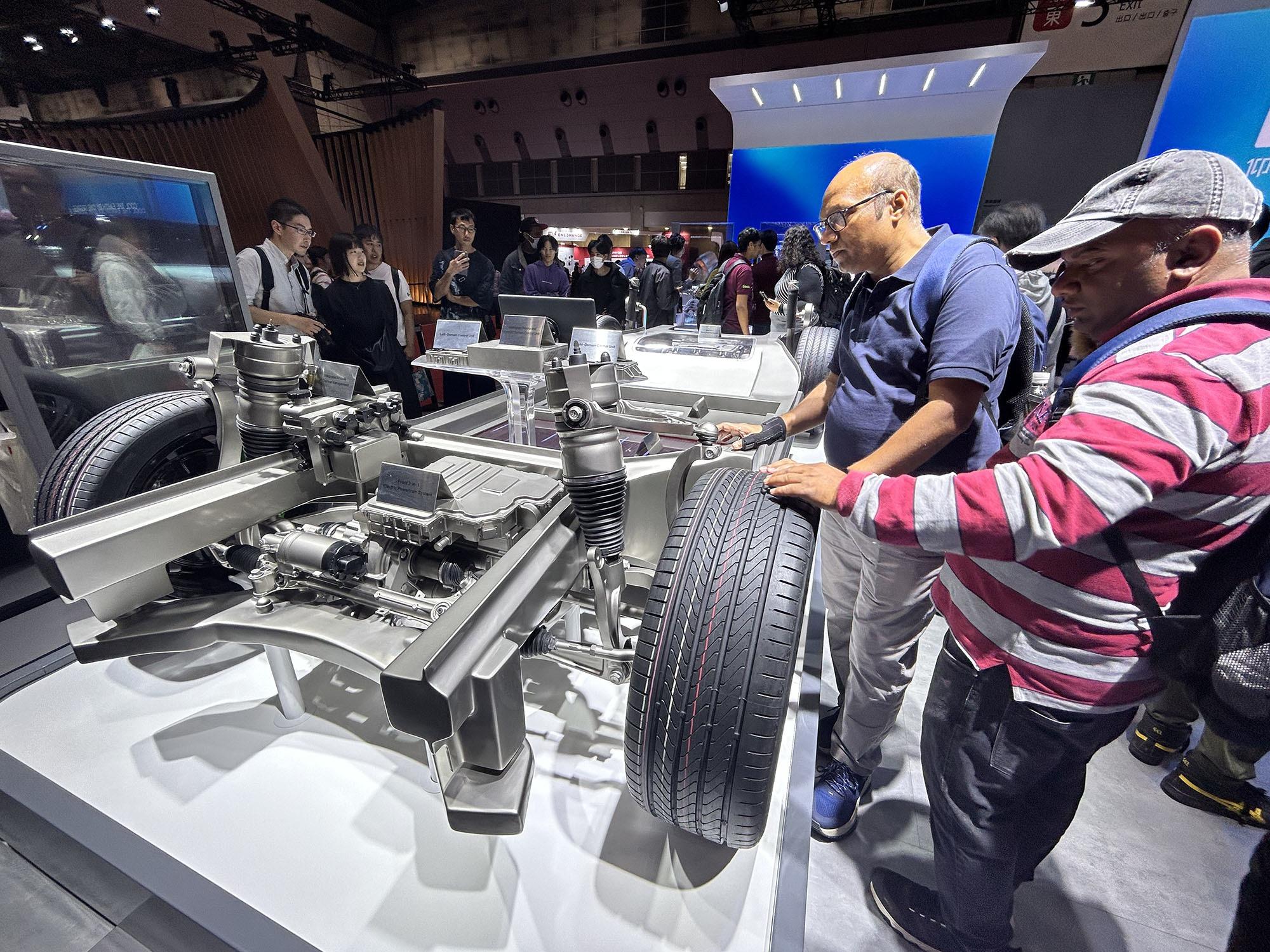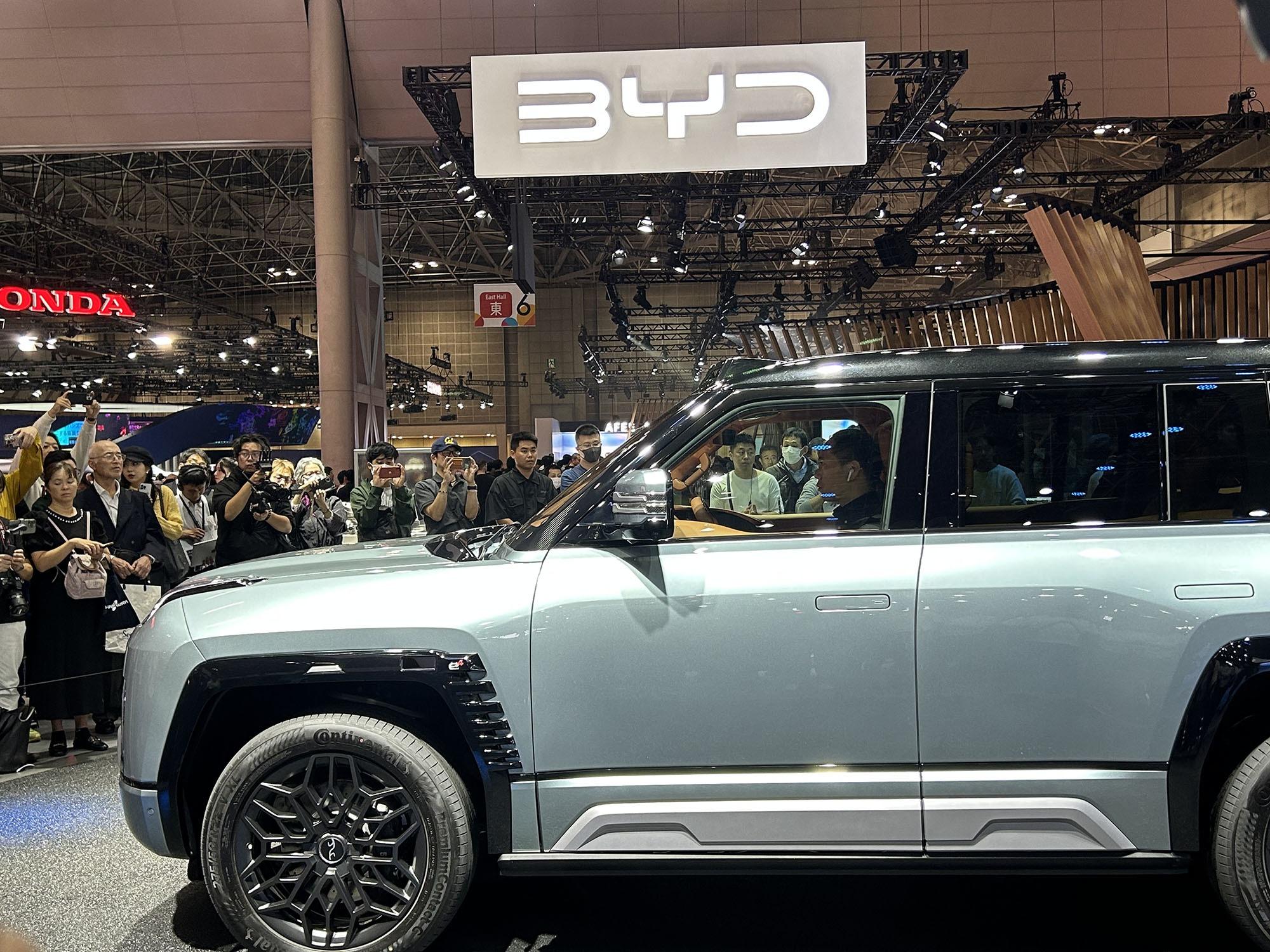China to remain world's top vehicle exporter, with nation's automakers set to expand overseas presence, focusing on NEVs
 BYD showcases five electric vehicle models and core technologies at the Japan Mobility Show 2023, formerly known as the Tokyo Motor Show, in Tokyo in October. (PROVIDED TO CHINA DAILY)
BYD showcases five electric vehicle models and core technologies at the Japan Mobility Show 2023, formerly known as the Tokyo Motor Show, in Tokyo in October. (PROVIDED TO CHINA DAILY)
In July 2022, when Chinese electric vehicle maker BYD launched its passenger car in Japan, it surprised the local media, consumers as well as peers.
However, companies familiar with BYD's development in Japan over the years said it was inevitable because the automaker had accumulated years of industry experience in Japan, a country with a strong automotive sector, said Liu Xueliang, general manager of BYD Asia-Pacific auto sales division.
... it is more important for us to promote and accelerate the development of electric cars in Japan. We hope to collaborate extensively with more local dealers.
Liu Xueliang, general manager of BYD Asia- Pacific auto sales division
"We have implemented BYD's development philosophy in Japan over the past 24 years through its industrial layout. Therefore, what you see in this market today is not only a single product, but also a contribution to the Japanese economy from information technology to transportation, from batteries to cars," Liu said.
BYD's journey overseas, which Liu described as "challenging but promising", is closely related to China's booming EV exports. Last year, China overtook Japan as the world's largest auto exporter.
READ MORE: BYD gets vessel to ship EVs overseas as automaker leads in fast-growing field
According to the General Administration of Customs of China, the country's automobile exports reached 5.22 million units in 2023, a year-on-year growth of 57.4 percent.
As China vigorously advances a green and low-carbon transformation of the automotive industry, it exported 1.77 million electric passenger vehicles last year, up 67.1 percent year-on-year.
In comparison, Japan's auto exports in 2023 were 4.42 million units, according to data released by the Japan Automobile Manufacturers Association.
China surpassing Japan in automobile exports is an inevitable outcome of its industrial transformation and social development, Liu said.
"In the field of new energy vehicles, China has taken a leading position globally. Today, the richness of China's NEV products, the maturity of technology and stability have been validated through the country's development over the past decade. The international acceptance of Chinese automakers venturing abroad is evident," he said.
As consumer demand for NEVs is increasing, Liu expects China will maintain its position as the world's top vehicle exporter. Chinese automakers will continue to expand their presence worldwide, with a focus on NEVs, he said.
Since its establishment, BYD has been firm in its international development strategy.
The carmaker entered the Japanese market with rechargeable batteries in 1999. Subsequently, it became involved in Japan's IT industry and brought solar panels to the Japanese market around 2008.
In 2015, BYD's electric buses arrived in Japan for the first time. It took the Chinese automotive brand nearly 10 years to make Japanese customers in the public transportation sector fully realize the reliability and trustworthiness of its electric buses.
Today, the company holds a market share of over 70 percent in electric buses in Japan. Twenty-four prefectures in the country use its electric buses, with the number totaling nearly 200.
"In 2024, our electric bus sales should double. We hope to have 4,000 BYD electric buses in operation in Japan by 2030," Liu said.
 BYD showcases five electric vehicle models and core technologies at the Japan Mobility Show 2023, formerly known as the Tokyo Motor Show, in Tokyo in October. (JIANG XUEQING / CHINA DAILY)
BYD showcases five electric vehicle models and core technologies at the Japan Mobility Show 2023, formerly known as the Tokyo Motor Show, in Tokyo in October. (JIANG XUEQING / CHINA DAILY)
EV ambitions
BYD has launched two passenger EV models in Japan — the Atto 3 mid-size sport utility vehicle and the Dolphin hatchback. Another midsize fastback sedan, Seal, will be launched in Japan this year.
As of end-December 2023, the number of newly licensed BYD electric passenger vehicles in Japan exceeded 1,440.
"Japanese consumers are discerning when it comes to cars, with various preferences. BYD will gradually introduce different popular models based on actual market demand in Japan, allowing consumers to choose the model that suits them best from the BYD EV family," Liu said.
The starting price of the Dolphin, released in Japan in September 2023, is 3.63 million yen ($24,200).EV-related public subsidies from Japan further bring the cost down to 2.98 million yen.
Comparable in size to the Nissan Leaf, BYD says the Dolphin can travel around 400 kilometers per charge, surpassing the Leaf's range.
Shinya Omori, president of SC-ABeam Automotive Consulting, told Japanese daily Yomiuri Shimbun that the Dolphin's affordability and its classification as a compact car, popular in Japan, could contribute to its swift sales success in the country.
Nonetheless, a source close to a Japanese car manufacturer expressed concerns about BYD's limited recognition in Japan, potentially hindering widespread adoption of the model.
Gaining recognition from Japanese customers is a challenging task for Chinese automakers in the short term, said Roy Lu, an independent auto analyst in Shanghai.
"Compared with other overseas markets, Chinese automotive companies are not very familiar with Japan and their understanding of local consumers is limited as well, so cultivating brand awareness and winning the first group of buyers will be a particularly crucial start," Lu said.
As a startup passenger car brand, BYD's brand awareness in Japan is far from the expected target.
"How to instill confidence in consumers about the BYD brand is an area where the company still has a long way to go. Because of this, we continuously focus on and value our cooperation with dealers," Liu said.
Apart from working together with local partners to consistently bring products that suit different consumers, the EV maker also aims to optimize its after-sales service system in the Japanese market.
BYD has partnered with Meiji Sangyo, a Tokyo-based auto parts company, to address the shortage of EV mechanics in Japan. Staff from BYD's dealerships commute to an e-garage operated by Meiji Sangyo in Kanagawa prefecture for specialized training sessions, Nikkei Asia reported.
Currently, the pace of EV adoption in Japan is slow. On the one hand, there are relatively few models of electric cars to choose from in the country. A survey conducted by BYD found that though Japanese consumers have expressed an interest in electric cars, they have not found suitable models in the domestic market.
On the other hand, hybrid electric vehicles in Japan are well-made and highly recognized. This may have affected the speed of growth of pure electric cars.
 BYD showcases five electric vehicle models and core technologies at the Japan Mobility Show 2023, formerly known as the Tokyo Motor Show, in Tokyo in October. (JIANG XUEQING / CHINA DAILY)
BYD showcases five electric vehicle models and core technologies at the Japan Mobility Show 2023, formerly known as the Tokyo Motor Show, in Tokyo in October. (JIANG XUEQING / CHINA DAILY)
Policy support
Despite these factors, Japanese automobile manufacturers have gradually released information about upcoming electric vehicles, including lightweight electric cars. Additionally, the Japanese government has introduced carbon neutrality goals and subsidy support for electric cars.
The likely widespread adoption of electric vehicles is a crucial pathway for the country to achieve carbon neutrality by 2050 and a 46 percent cut in greenhouse gas emissions in fiscal year 2030 from its fiscal year 2013 levels. BYD's EVs will actively contribute to Japan's early achievement of carbon reduction targets, Liu said.
"Electric vehicles are not targeted at a single market, but represent the overall trend and direction of future development. Japan may need more time, but it is necessary and feasible for us to let Japanese consumers have sufficient exposure to BYD's products through different scenarios," he said.
Last year, BYD showcased five EV models and core technologies at the Japan Mobility Show 2023, formerly known as the Tokyo Motor Show.
"As the first Chinese automaker to participate in the history of the event, attending this exhibition is significant for BYD. It not only helps promote the BYD brand, but, more importantly, allows Japanese consumers to personally experience that EVs are a direction and trend," Liu said.
On Feb 1 last year, BYD opened its first dealership in Yokohama, Kanagawa prefecture. By the end of last year, there were 51 sales outlets in Japan where one could buy BYD electric cars, including 17 dealerships. The company aims to establish 100 dealerships in Japan by 2025.
"Apart from bringing BYD's technology and products to Japan, it is more important for us to promote and accelerate the development of electric cars in Japan. We hope to collaborate extensively with more local dealers," Liu said.
BYD's marketing model in Japan is based on collaboration with local dealers because this is believed to be the closest approach to consumers.
"To make consumers truly feel that BYD is around them, it is essential to engage in face-to-face communication. Although this approach may not lead to rapid promotion, it subtly and gradually builds trust in BYD electric cars among Japanese consumers," Liu said.
The EV maker has participated in exhibitions, organized test drives, and offered consumers various experiential activities. It conducted outdoor camping activities near Mount Fuji, where power sources came from BYD vehicles at night. At the end of last year, the company used its electric car to illuminate a Christmas tree in central Tokyo.
"We let customers feel that BYD cars are not just a means of transportation, but an integral part of their lives. Consumers can treat BYD cars as their living room, cinema and more. We showcase the upcoming lifestyle with many aspects relying on the EV platform," Liu said.
Japanese consumers have unique perspectives on cars, quality requirements, and service system expectations compared to consumers in other markets. Consequently, the market share of imported vehicles in Japan has never exceeded 10 percent.
Local carmakers enjoy very strong loyalty of Japanese consumers. Though some foreign brands have been present in Japan for decades, they have insignificant market share, said Yale Zhang, managing director of consultancy Automotive Foresight.
Despite this, Chinese automakers can, like those foreign brands, prove their capability to enter this market, which will contribute to their global brand awareness, Zhang said.
"Establishing a subsidiary in Japan of a reasonable size to ensure its visibility not only benefits the global brand image of an automaker, but also helps it recruit more and better experts in various aspects such as design, research and development, and marketing in the Japanese automotive industry," he said.
Lu, the Shanghai-based auto analyst, said some Chinese automotive companies see Japan as a stepping stone to larger markets like Europe and the United States; so they will leverage their advantages in electrification and smart in-cabin experience.
As such features will eventually become the norm for carmakers, the early-mover advantages will help Chinese automotive companies secure a position in the future, Lu said.
"We highly respect the Japanese market. Entering this market also demonstrates BYD's confidence in its overseas strategy," said Liu.
ALSO READ: BYD overtakes Tesla in sales for Q4
Should BYD successfully penetrate the Japanese market, known for its advanced automotive industry, it stands to gain global support, said Takeshi Miyao, CEO of industry research firm Carnorama Japan, in an interview with Nikkei Asia.
Additionally, the experience gained in the Japanese market, especially the service requirements in Japan, can be extended to the development of surrounding markets.
The development of Japan's EV market has not yet entered a truly competitive track, Liu said.
Japanese automakers have introduced EVs, but the variety is limited, and market attention is not very high. Foreign brands, whether German or Korean, have also launched electric cars in Japan.
"With BYD's arrival, everyone, through their respective efforts in enriching product lines, is aiming to generate more consumer interest in electric cars and encourage people to consider owning an EV. Only then will genuine competition emerge," he said.
Contact the writers at jiangxueqing@chinadaily.com.cn


